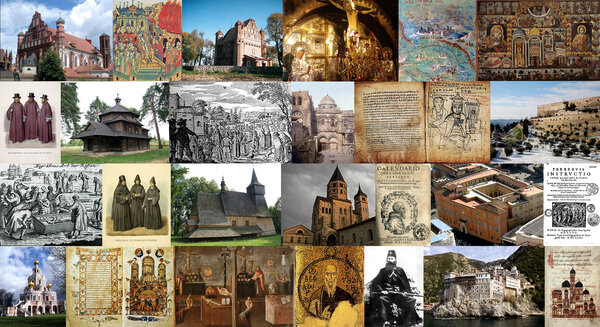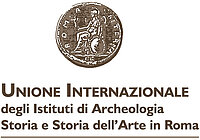Norms and practices of religion between East and West (9th-19th centuries). A comparative history (histoire croisée) of circulations between the Christian communities of Europe and the Mediterranean
- Sections: Middle Ages and Modern and Contemporary periods
- Director: Camille Rouxpetel, member of the EFR (third year), Middle Ages section and Doctor in medieval studies, University of Paris IV-Sorbonne; Laurent Tatarenko, doctor of modern history (CERCEC)
- Réseau des EFE: programme on collaboration with l’École française d’Athènes
- In partnership with the CRFJ
Presentation
How are the normative frameworks of the Christian populations of the European and Mediterranean area constructed over the long term ?
Our investigation will examine, through an interconnected perspective, the relationships between the "Latin", "Greek" and "Eastern" traditions, often renegotiated through complex modifications of practices and under the influence of competing political powers - Catholic, Orthodox, Protestant or Islamic.
The objective will be to understand the movements between the different models that have (re) shaped the borders of communities at different levels through competition, rejection or mimicry. The programme will investigate this issue through the examination of four main themes: sacred spaces, the evidence of the sacraments in social regulations, community belonging and political constructions, and, finally, the definition and uses of the archive.
The historiography of relations between the Churches of the East and West has long been marked by the importance of ecclesiological questions reinterpreted in the light of political and national concerns. This focus can be explained in two ways: first by the interference of contemporary thought by the authors in their perceptions of past intercommunity and interfaith exchanges, then by the very nature of the documentation available. This reveals a notable imbalance, exacerbated for the medieval period, between the sources available for the Churches of the East and those of the West and gives a predominant place to the conciliar acts, to the diplomatic correspondence and to the narrative sources.
The project thus aims to reflect on the very notion of ecclesiastical norm, between practice and model: what are the processes followed in the enunciation of a norm and what about its performative power compared to the daily practices of the 'Church? The relevance of this question is only fully revealed over the long term, which transgresses the barriers between medieval, modern or contemporary periods and the demarcations between specialists from the East or the West, theologians or historians. Only a comparative approach between periods and between territories, within various political contexts, allows us to truly grasp phenomena which are far from being linear. How do the relationships between sovereign powers, churches and communities influence the definition of practices and their own identity? The variety of legal frameworks, particularly the dhimma, which itself overlapped many different situations, adds to the lability of the collective identity of each Church and each community, reformulated in a permanent tension between self-definition and recognition by the authorities, historical legitimacy and social opportunity. For this, each of the three institutional centres of the programme shed light on normative production: Jerusalem through the heightened competition of different Christian communities under Islamic sovereignty; Rome through its constant interactions with all of Christendom; and Athens through the prominence of the Byzantine heritage as a marker that was accepted or disputed in all of the Christian traditions of the Eastern rite.
Keywords
Christians of East and West; Near East; Eastern and Balkan Europe; Byzantine world; intercultural studies; institutional history; connected history; Middle Ages; modern and contemporary periods
Key statistics
In 2017:
- 2 scientific meetings, in Rome and Jerusalem;
- 5 missions connected to archives, in the 3 spaces linked by the programme, the Near East, the Aegean and Central and Eastern Europe;
- around thirty researchers involved.
Partners
6 partner institutions:
- Réseau des Écoles françaises à l'étranger : École française de Rome and École française d’Athènes
- Centre de recherche français à Jérusalem
- Centre d’Études en sciences sociales du religieux
- Centre d’Études des mondes russe, caucasien et centre-européen
- Université catholique de Louvain
- CRHIA-Université de Nantes
Calendar of events for 2017
In 2017 two public scientific events are planned:
- Rome, École française de Rome, February 6, 2017, Building Confessional Identities in the Ottoman Empire (16th-18th centuries)
- Jérusalem, Centre de recherche français à Jérusalem, 29-31 mai 2017, Normes et territorialité entre Orient et Occident : invention, partage et mémoire des espaces sacrés (Norms and territoriality between East and West: invention, sharing and memory of sacred spaces)
Expected results
The archive research, carried out in the Slavic territories (L'viv, Vilnius and Kotor), should make it possible to create a case study on the exercise of the right of patronage and the management of ecclesiastical goods by the parish communities on the confessional borders of central and Balkan Europe (16th to 18th century). The archive missions in Jerusalem are aimed at understanding the territorial competition between the various churches in the major holy sites of Palestine up to the Mamluk period (14th to 16th century).












